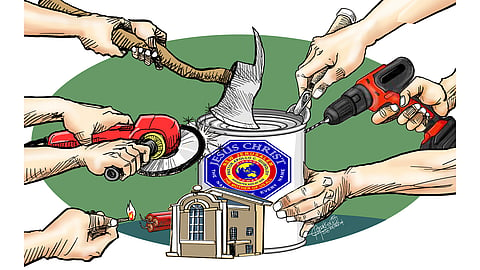
- NEWS
- the EDIT
- COMMENTARY
- BUSINESS
- LIFE
- SHOW
- ACTION
- GLOBAL GOALS
- SNAPS
- DYARYO TIRADA
- MORE

The Philippines recently witnessed a high-profile operation involving over 2,000 policemen deployed to serve an arrest warrant on Pastor Apollo Quiboloy, the controversial leader of the Kingdom of Jesus Christ (KoJC) church.
Quiboloy, facing charges ranging from human trafficking to fraud, has long been a polarizing figure in the country. His influence stretches across the religious, political, and social spheres, and he has the financial resources and vast follower base to make any legal action against him a complex and delicate matter.
The massive police deployment has drawn intense criticism, with some describing it as an overkill, while others defend it as a necessary precaution to prevent potential unrest. Central to this debate are two critical issues: Was the large-scale mobilization warranted, and was it intended to prevent an uprising akin to the “people power” movements that have punctuated Philippine history?
The sheer number of officers deployed has led many to question the necessity of such a large force. Was it really required to arrest one man, even one as influential as Quiboloy? On the surface, the deployment seems disproportionate, especially when compared to the usual procedures for serving warrants, which typically involve only a handful of officers. This leads to speculation that the government was either overestimating the threat posed by Quiboloy’s supporters or using the occasion to send a broader message about law enforcement’s strength and resolve.
Critics argue that this type of excessive force might reflect a growing trend in the government to over-police controversial figures, particularly those who hold sway over large groups of people. The imagery of hundreds of police officers surrounding Quiboloy’s compound could be seen as an attempt to intimidate not only the pastor himself but his followers, many of whom are deeply devoted to him. These critics posit that the vast police presence could erode public trust in law enforcement by making it seem more like a tool of political intimidation than a neutral enforcer of the law.
On the other hand, some see the large-scale operation as a prudent measure. Quiboloy is no ordinary citizen; he is the self-proclaimed “appointed son of God” with millions of followers worldwide, many of whom view him as divinely anointed. Given the historical precedence of religious movements sparking mass protests, it was not unreasonable for authorities to prepare for the possibility of violent resistance from Quiboloy’s loyalists. The large police presence may have been intended as a deterrent, ensuring that any potential unrest was swiftly contained before it could spiral into something more dangerous.
One of the key justifications for the sizable police force was the fear of an uprising. The Philippines has a long history of successful mass movements, from the EDSA People Power Revolution in 1986 that ousted Ferdinand Marcos Sr., to the smaller but significant protests that have followed since. These movements have proven that when a charismatic leader commands the loyalty of a substantial portion of the population, the potential for large-scale unrest is very real.
Quiboloy, with his vast influence and resources, could potentially galvanize his followers into taking to the streets to defend him. His sermons and public declarations often carry apocalyptic tones, warning of divine retribution against his enemies and the need for his followers to remain loyal. This messaging, combined with the potential for frustration and anger over his legal troubles, could indeed create a flashpoint for mass protests.
However, while this preventive strategy may seem logical on paper, it runs the risk of escalating tensions. The large police presence could be interpreted by Quiboloy’s followers as a form of persecution, feeding into his narrative of being a divine figure under attack from the forces of evil. If mismanaged, the situation could backfire, causing even more unrest than anticipated.
Whether this operation will be remembered as an overreaction or a necessary measure will largely depend on what happens next. If Quiboloy’s arrest proceeds without significant unrest, it could be seen as a justified precaution.
But if the large police presence exacerbates tensions or leads to accusations of political persecution, it could mark yet another chapter in the ongoing struggle between power, faith, and justice in the Philippines.
